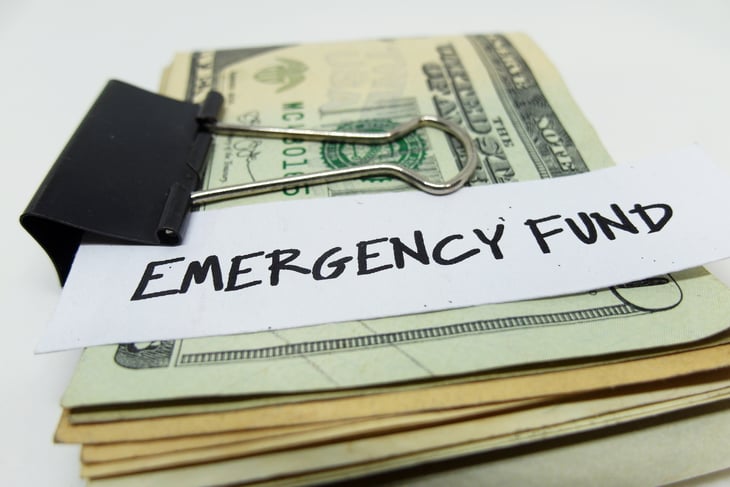
Editor's Note: This story originally appeared on NewRetirement.
Having adequate emergency savings is the basic foundation of financial wellness.
In fact, emergency savings should be your first priority when it comes to taking control of your money.
Be it a flood, fire, health event, job loss, downturn in the economy, or anything else, emergency savings can help you get through any tough spot without going into debt.
What Are Emergency Savings?

Emergency savings are funds that are easily accessible and set aside to be used for emergencies or unexpected expenses. It is most common to retain emergency funds in a money market account or another low-risk vehicle.
Unexpected events, ranging from medical emergencies to sudden job loss, can quickly unravel even the most carefully planned budgets. Acting as a financial safety net, emergency funds provide a buffer to weather unforeseen circumstances.
Life is unpredictable. In fact, the only thing that you can know is that something you weren’t expecting will occur. Emergency savings enable you to be prepared for the unknown.
Most People Lack Sufficient Emergency Savings

According to the Consumer Financial Protection Bureau (CFPB):
- Nearly a quarter of consumers have no savings set aside for emergencies.
- 39% have less than a month of cash available to take care of a financial shock.
- Disadvantaged consumers, those who will be hurt the most by an emergency, are the least likely to have emergency savings.
- Consumers with no emergency savings are the most likely to struggle to meet financial obligations.
- Having emergency savings better positions people to save for and invest in homeownership, retirement savings accounts, and other wealth-building financial instruments.
Without Emergency Savings, You Run the Risk of Digging a Deep Financial Hole

Without emergency savings, any financial shock can set you back, and if you have to borrow to cover your obligations, even a minor emergency can have a lasting impact.
Taking on debt is akin to digging yourself into a financial hole. Debt can make a minor expense a major cost and mean that getting ahead and saving adequately for the future is harder than ever.
You might believe that a steady income and healthy lifestyle will protect you from financial disaster, but it won’t.
What would happen if you were in a car accident and unable to work for some period of time? Medical bills, rehabilitation costs, and loss of income could mean that you need to borrow money, accumulate high-interest debts, and compromise your long-term financial goals.
How Much Emergency Savings Do You Need?

The amount of emergency savings individuals should have saved can vary depending on factors such as income, expenses, lifestyle, and personal circumstances.
However, here are general guidelines for recommended emergency savings based on different age ranges.
Early 20s to 30s

During this stage of life, it’s advisable to aim for an emergency fund that covers at least three to six months’ worth of essential expenses. This includes rent/mortgage, utilities, food, transportation, and insurance.
As individuals in this age range may have lower financial obligations and fewer dependents, they can focus on building a solid foundation for their emergency savings.
40s to 50s

By the time individuals reach their 40s and 50s, they should aim to have an emergency fund that covers six to 12 months’ worth of essential expenses.
At this stage, financial responsibilities may increase, such as mortgage payments, children’s education, and health care costs. Building a more substantial emergency fund provides a greater cushion to navigate these potential financial challenges.
60s and Beyond

As individuals approach retirement or enter their retirement years, it becomes even more critical to have a robust emergency fund.
Aiming for a minimum of 12 months’ worth of essential expenses is recommended. This is because unexpected healthcare expenses or market downturns can have a significant impact on retirees.
Having a larger emergency fund helps mitigate these risks and provides a greater sense of financial security during retirement.
Why So Much Emergency Savings in Retirement?

Emergency savings are necessary in retirement to enable you to bridge through multi-year downturns in the stock market.
Let’s say that you are successfully retiring with what should be adequate savings to last your lifetime.
If all of your money is invested when the stock market crashes and you need to make significant withdrawals during the downturn to sustain your lifestyle and cover essential expenses, you may be forced to sell investments at a big loss, derailing what should have been adequate money for a secure future.
The Exact Amount You Need Will Vary

It’s important to note that these guidelines are general recommendations, and personal circumstances can vary. Factors such as job stability, health conditions, and individual risk tolerance should also be considered when determining the appropriate amount of emergency savings.
Additionally, as personal financial situations evolve over time, regularly reassessing and adjusting emergency savings goals is crucial to ensure ongoing financial wellness.





Add a Comment
Our Policy: We welcome relevant and respectful comments in order to foster healthy and informative discussions. All other comments may be removed. Comments with links are automatically held for moderation.